Out & About: Vermont Center for Ecostudies continues Backyard Tick Project
| Published: 04-19-2024 5:31 PM |
WHITE RIVER JUNCTION — The Vermont Center for Ecostudies is looking for people who are willing to allow researchers to study their lawns as part of the Upper Valley Backyard Tick Project.
Jason Hill, a quantitative ecologist at the White River Junction-based nonprofit organization, started the program last year to collect data about how tick treatments — or lack thereof — affects other insects who also live on lawns.
“The original goal of the research was to understand if there are unintended consequences for insect populations as a result of tick spraying,” Hill said. “Our goal is to empower homeowners to make informed decisions about how they manage their own properties.”
Hill and others surveyed more than 70 properties last year and are looking to visit dozens more this spring and summer. While Hill’s team is focused on homes and commercial properties within 20 minutes of Hartford, including Lebanon, Norwich and Hanover, they welcome people from all over the Upper Valley to contact them.
Results collected from the first year of the study show that applying tick treatment to lawns — whether with essential oils or other products — have shown a reduction in both the tick population and that of other insects, Hill said.
“Which really shouldn’t be surprising,” he said. “Some of the groups that appear to be most affected from the first year were spiders and caterpillars.”
Hill is particularly interested in connecting with people who have their lawns treated with permethrin or other traditional pesticides. Homeowners who participate in “No Mow May,” a movement which encourages people to let their grass grow long in May to provide pollinators with more food sources, can also participate in the study.
Researchers visit properties twice: a few days before a tick treatment is applied and a few days following it. They also visit “control” properties, which are lawns the owners do not treat for ticks. During their outings, researchers use a beating sheet — a trap that aids in insect collection but leaves them unharmed — to collect invertebrates. They then identify and count the insects, releasing all except the ticks, which are taken back to the center’s lab for further study.
Article continues after...
Yesterday's Most Read Articles
 Hartford Selectboard mulls closing road off Sykes Mountain Ave
Hartford Selectboard mulls closing road off Sykes Mountain Ave
 After a year of looking, White River Junction couple finds new home
After a year of looking, White River Junction couple finds new home
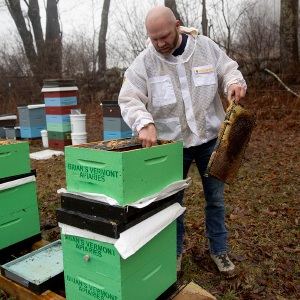 Upper Valley beekeepers assess winter losses
Upper Valley beekeepers assess winter losses
Abby Olivier signed up for the study last year. She hired a company two years ago to spray her Wilder property with essential oils intended to kill ticks. She and her husband had previously been on the fence about treating their lawn, but then their then 18-month-old son came down with anaplasmosis, a disease that is caused by ticks.
“At that point it was something we decided we really wanted to try,” Olivier said. They decided to use organic methods over traditional pesticides because they have fruit trees and other gardens on their property.
“I was worried, I was personally concerned, I wasn’t somebody who ever thought of spraying anything,” Olivier said. Her family, which includes her two sons, now 5 and 3, and a dog, spend a lot of time going back and forth from their home to their yard, which makes it tough to check for ticks every time. “We feel like it’s been very effective for controlling the ticks at least.”
She decided to sign up for the study because she wanted to help the Vermont Center for Ecostudies collect data and also wanted to see what other insects were being affected by the treatment — particularly pollinators. The roughly half hour Hill spent at their home was enjoyable especially for Olivier’s sons, who took a lot of interest in what insects were being collected.
“My boys were just asking a million questions about bugs,” Olivier said. “It was just neat to see that part of it too and talk to my boys about someone who does research and you can do this too.”
Patti Cerra, of Norwich, participated in the study last year as a control property.
“(I) do not treat the lawn for ticks because I’m too concerned that the treatment may inadvertently harm other bugs/pollinators and the species that prey on those bugs,” Cerra wrote in an email.
Cerra said she became interested in tick management after being diagnosed with Lyme disease 11 years ago.
“Unfortunately since humans do not develop an immunity from the bacteria ticks carry I am vigilant about doing what I can, to prevent getting bit again,” Cerra wrote, adding that she wears her socks over her pants and light colored clothing while outside. She also does tick checks twice a day.
She signed up for the study to learn more about ticks and their habitats.
“I’m grateful to VCE, Jason and his team for taking the time to focus on the issue of our abundant tick population,” Cera wrote. “It was fascinating that his data turned up more American Dog Ticks than the Black Legged Ticks (deer ticks) last year, exactly what I had been seeing on our dog and occasionally on our clothes.”
This is the last year Hill is planning on conducting the study. All results, including raw and analyzed data, will be shared with participants and the public.
To learn more about the study and/or to sign up to participate, visit vtecostudies.org/upper-valley-backyard-tick-project. Liz Sauchelli can be reached at esauchelli@vnews.com or 603-727-3221.

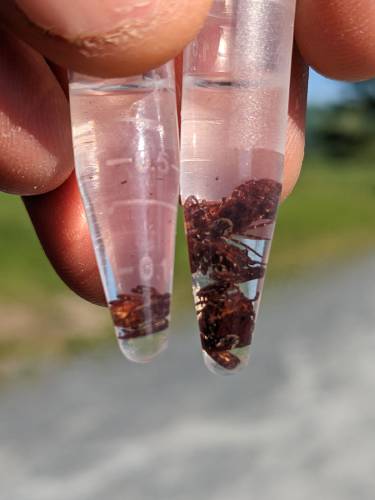
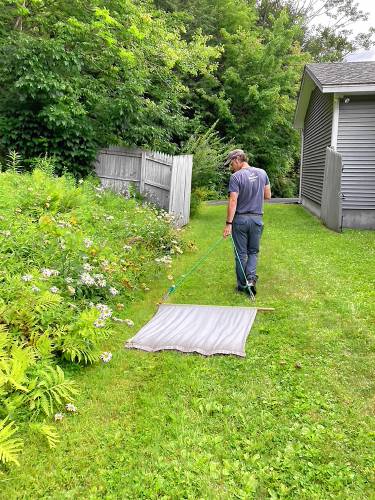
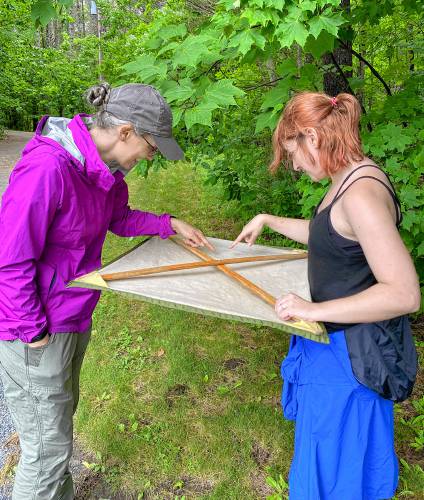





 Art Notes: ‘If you love ‘Messiah,’ you’ll love this piece’
Art Notes: ‘If you love ‘Messiah,’ you’ll love this piece’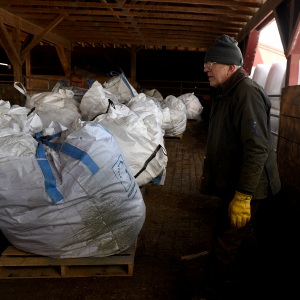 Farmer-led project gets grant to recycle agricultural plastics
Farmer-led project gets grant to recycle agricultural plastics Art Notes: We the People’s latest show offers hopeful message
Art Notes: We the People’s latest show offers hopeful message
